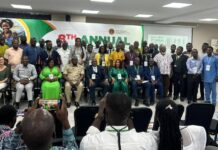Capacity building remains a critical tool that must not be discounted if we will effectively bridge the gap that exists between Agric and other sectors.
Occasionally structured capacity building forums are a must-have if we will be able to improve the capacity of farmers to better appreciate where the future of agriculture is currently headed.
According to industry-experts, Capacity building efforts must be calculated rather than rushed; and must involve a lot of stakeholder engagement. This will guarantee positive results that will ultimately culminate in a general improvement in the ability of the farmer to rely on improved knowledge for better output.
The need for Training is a recurrent theme that has dominated conversations on-farm productivity. Indeed without a conscious effort to adopt modern agricultural techniques, the potential for increased productivity will perpetually remain a mirage.
The outmoded farming practices must give way to new modern practices that will consequently lead to improved livelihood for farmers who have proven to be no less ambitious.
A modern training module that takes into account contemporary dynamics is a failsafe means of breaking the vicious cycle of poverty that is often caused by low productivity.
Because of the pivotal role played by farmers in the country, any investment that seeks to improve their capacity for increased production goes a long way to help build the capacity of several individuals in society.
The preceding plot signifies to a large extent the fulcrum around which Ghana’s premiere Agric showpiece, the 9th Pre-Harvest Conference and Exhibition was held in the Northern Regional Capital, Tamale.
Ghana Commodity Exchange.
In a display of practical support for the local Agric sector, The Ghana Commodity Exchange (GCX), joined forces with organizers in their role as sponsors and facilitators for the annual Agric-event.
The Ghana Commodity Exchange was launched by the government of Ghana in November 2018 to provide a structured market system that could support Ghanaian producers of food crops, particularly smallholder farmers through affiliation to programs like the Planting for Food and Jobs and One District One Factory.
GCX is currently working hand in hand with the Ghanaian private and public sectors to transform Ghana’s economy by creating opportunities for Ghanaian smallholder farmers to access better markets and financial opportunities.
Reacting to a pre-event questionnaire designed to elicit the views of partners, the Ghana Commodity Exchange (GCX), revealed the motivation for sponsoring the event. “For us, the pre-harvest platform presents us an opportunity to connect markets, connect people and provide opportunities to farmers and processors of commodities listed and to be listed on the Exchange market.
Specifically, we would look to connect to farmers who cultivate maize, soya, sorghum, rice, sesame, millet, beans, cashew, and other grains as well as processors of same and commercial farmers.”
On the relevance of this year’s theme “Market Accessibility: The Structured and Sustainable Pathway”, GCX noted that it supports its primary vision and operational principles. “It matches our mission and purpose which is tied to connecting markets, connecting people, providing opportunities.
We are thrilled to be part of this event and expect Market availability for commodities; warehouse and storage facilities in maize, soya catchment areas; warehouse receipt financing availability effective October 2019.
We also look forward to using the opportunity to highlight the availability of warehouse and storage facilities in specific areas in the country to reduce post-harvest losses; availability of warehouse receipt financing effective October 2019 and availability of market for commodities.
Our main activities during the event included: The activation of warehouse receipt financing on the Exchanges’ electronic platform and the upcoming listing of sesame, rice, and sorghum on the Exchanges’ platform.”
In his remarks, CEO OF GCX, DR. Kadri Alfah explained the motivation behind the creation of the Ghana Commodity Exchange and shed further light on the basis for supporting the event.
“Ghanaian small-scale farmers are the main target of the exchange, supporting them to aggregate their harvested commodities, transport their commodities from farms to safe storage, supporting them to undertake value addition services to increase marketability ( such as sorting, cleaning, drying, re-bagging, weighing, grading and certification ), providing a platform to link farmers to diverse buyers, facilitating farmers to access loans from banks at affordable interest rates, provision of price and market information for informed selling decision making and facilitating immediately payment after selling to a GCX approved buyer.”
He highlighted the operational capacity of the firm and indicated that the pre-harvest platform was an important visibility window for GCX.
“Currently, GCX operates warehouses at Ejura, Wenchi, Sandema, Tamale, Wa, Kintampo, Kumasi, Wenchi and Maame Krobo ( Afram plains ) where Ghanaian smallholder farmers receive all these services. In the next twelve months, the GCX expects to support about a million smallholder farmers throughout Ghana with the services it provides. This initiative is expected to help drive agricultural production increase and improved access to agricultural markets and financial services for Ghanaian farmers.
GCX works with the private sector, public sectors, developmental institutions, NGOs, financial institutions through agreements to support Ghanaian smallholder farmers to access its services and products.
We believe that our participation in the pre-harvest event would provide visibility to the GCX, its product and services and opportunities for smallholder farmers, the private sector and public sector to use the enormous benefits that the Ghana Commodity Exchange provides for them.” He concluded.
Background.
The event which is easily the most expansive agricultural showpiece in Ghana took place at the Aliu Mahama Sports Stadium from 25th -27th September 2019, with a call on stakeholders to identify and take advantage of the various opportunities available in the agricultural sector for expansion.
For the second year running, the event took a three-day dimension; with organizers structuring the event to reflect in-depth insights, actionable and practical tools of engagement models, methods and mechanisms for improved productivity by industry firms. Led by seasoned resource persons, participants savoured riveting seminar sessions that had been deliberately structured to improve knowledge and incite the zest for a collective vision of propelling agriculture to loftier heights.
Having received a considerable amount of pre-event media herald, the venue of the event was thronged by major players in the various sectors of the agricultural value chain such as farmers, buyers, processors, transporters, input dealers, equipment dealers, financial institutions, policymakers among others.
The event was graced by government officials, international donor organizations, the Diplomatic Community among others-the major draw was a unique opportunity for knowledge exchange and a renewed drive for exploring practical ways through which the sector could become more attractive and profitable through best practices.
Event Basis.
Billed under the theme, “Market accessibility: The Structured and Sustainable Pathway”, the Pre-harvest Agribusiness Exhibition and Conference is an interventional forum that presents real opportunities for various value chain actors in the Agric sector to meet, discuss business, contracts and work together as a coherent team whose goal is to ensure that enough produce is available locally for consumption; thereby mitigating the risks associated with excessive importation. The annual Agric showpiece is made up of farmers, public and private sector business officials and other stakeholders who collectively share an innate desire to see an improved agricultural sector for Ghana.
The event provided participants a platform where diverse services linked to the Agric sector, such as seed production, fertilizer, finance, fisheries, storage, machinery, livestock, and packaging & processing, ICT among others.
Participants were equally taken through practical and engaging sessions at the conference to enable them to gain deeper insights into best practices as well as how to take full advantage of the numerous opportunities in the Agric sector for growth and expansion.
Last year, the event recorded a total of 3,122 participants and 141 exhibitors including farmers, traders, commodity brokers, input companies, machinery and equipment providers, transporters, financial institutions, ICT, Innovations, Poultry and Livestock companies, packaging and processing companies, development practitioners and government agencies, among others; and subsequently clinched the Agribusiness event of the Year award.
Organizers believe that the showpiece will ultimately help address and find lasting solutions to a myriad of challenges confronting the industry today by assisting farmers and agri-businesses expand their businesses before and after harvest and create an enabling environment for new partnerships to promote the growth of Ghana’s agricultural sector.
Initiated in October 2010 in Tamale in the Northern Region of Ghana by the USAID ADVANCE, the Annual Pre-harvest Agribusiness Exhibitions and Conference event allows for further growth, sustainability, and expansion. The USAID ADVANCE project has partnered with and subsequently handed over the organization of the Pre-Harvest event to the Agrihouse Foundation.
Event Structure
For optimum impact, organizers designed event sessions to give participants in-depth insight into the state of the industry today and the opportunities that lie ahead. Commodity Break-out session, Intensive and focused Training Programs, Farmer to Buyer Dialogue, Development Partner Forum were some of the sessions designed for the benefit of participants.
In the same strain, Panel Education sessions revolved around pertinent topics like Climate-smart agricultural approach and practices, Achieving an Innovative integrated food security & nutrition results, Market accessibility pathway, Production, process, and export impact to Rural development and Food security.
Training Sessions designed to improve that capacity of participants for improved productivity bothered on Warehousing and Storage technologies for post-harvest losses, Basic-to-advanced Financial Literacy education for Farmer Groups, Improving high and quality yields through appropriate production practices, Branding for Marketing Commercial Impact, Going digital to promote and grow your market, Developing a Business plan and Negotiation Skills .
Other pertinent topics addressed included: How will Ghana’s Agric Sector look like in 2023? What collective role can stakeholders play to change the face of the Agricultural sector, with a focus on input, production, processing, finance, branding, packaging and market accessibility? , Together, what can Government and Corporate organizations do to support and bridge the gap of pricing and access?, How structured and competitive are Governments projects, subsidy, and initiatives impacting the markets and accessibility? What Technological Innovations in Agriculture can attract Modern Youth?, How do we breed the next generation of Agricultural Entrepreneurs? Etc.
There was also a Business-to-Business Matchmaking session, Educational Field Trips, Policy Dialogue: Fertilizer subsidy policy boost / Update on Export for rural development and Exhibitions.
The 9th Pre-harvest Agribusiness Exhibition and Conference was organized by Agrihouse Foundation. A non-governmental agricultural social impact, capacity building, innovation and project management organization with a special focus on changing the perception of, and consciously shaping the conversation on agriculture through the promotion of people-impact initiatives and programs for students, women, farmers, farming associations, agribusinesses and the entire actors within the value chain.
The 9th Pre-Harvest Agribusiness Conference and Exhibition was collectively sponsored by UKaid, The MADE Programme, Yara Ghana, Ecobank, Kosmos Energy, GCX, Chemico ltd with partnership support from the Northern Regional Coordinating Council, the Northern Development Authority and the Ministry of Food and Agriculture.








